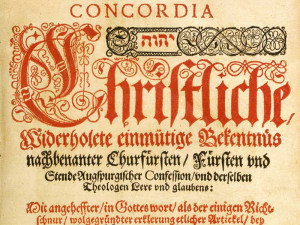by Rev. Paul Doellinger
 In Galatians, Paul recounts how Peter (Cephas) once extended to him “the right hand of fellowship” (Gal. 2:9). Things changed, however, in Antioch when Paul confronted Peter and pointed out his error, opposing him to his face “because He stood condemned” (Gal.2:11). In this famous confrontation, was Paul being “too strict on doctrine,” simply trying to “prove he’s right,” or was he up to something more?
In Galatians, Paul recounts how Peter (Cephas) once extended to him “the right hand of fellowship” (Gal. 2:9). Things changed, however, in Antioch when Paul confronted Peter and pointed out his error, opposing him to his face “because He stood condemned” (Gal.2:11). In this famous confrontation, was Paul being “too strict on doctrine,” simply trying to “prove he’s right,” or was he up to something more?
Read Galatians 2:11-21.
1. The Scriptures are filled with God’s commands and demands (Law) as well as His promises of grace and forgiveness (Gospel). The Formula of Concord Article V reads, “The distinction between Law and Gospel is a particularly glorious light. It serves to divide God’s Word properly [2 Tim. 2:15] and to explain correctly and make understandable the writings of the holy prophets and apostles.”[1] While “The Law is holy, and the commandment is righteous and good” (Rom. 7:12), what is it unable to do for the sinner?
2. The false teachers in Galatia were, as Luther says, “Changing the Law into grace and grace into Law, Moses into Christ and Christ into Moses. For they teach that after Christ and all the righteousness of Christ the observance of the Law is necessary for one to be justified.”[2] What are some works of the law, prescribed by present-day false teachers, which are added to the righteousness of Christ as being necessary in order for one to be justified?
3. “The Law of Moses accuses and damns me. But against this accusing and damning Law I have another Law, which is grace and freedom…To die to the Law means not to be bound by the Law but to be free from the Law…Therefore let anyone who wants to be alive in the sight of God strive to be found outside the Law, and let him come out of the grave with Christ.”[3] What is the purpose of the Law? What should the Christian insist he be judged upon: the Law or grace?
4. Luther says, “The maxim of all theologians (is): ‘He who lives according to the Law lives to God.” By contrast, Paul “teaches the opposite: ‘Unless you are dead to the Law, you do not live to God.”[4] Why is the Law, as a means to salvation, so attractive to the sinner?
5. Under the Law we “lose sight of Christ, who alone is (our) righteousness and life. Once He is lost, there is no aid or counsel; but certain despair and perdition must follow. By faith, the Christian looks to Christ alone: ‘Christ and my conscience become one body, so that nothing remains in my sight but Christ, crucified and risen.” [5] Since the Christian lives not “under the Law,” but “under Grace” (Rom 6:14), where should we constantly “fix” our eyes (Heb. 12:2)?
6. “To nullify the grace of God (means) to want to be justified by the Law… (Whoever) performs the Law with the intention of being justified by it nullifies grace, rejects Christ and his sacrifice, and refuses to be saved by this inestimable price; instead he wants to make satisfaction for his sins through the righteousness of the Law or to merit grace by his own righteousness.”[6] If justification and righteousness is achieved through the observance of the Law, then why did Jesus have to die? Where, then, is our comfort in the face of death and hell?
In his confrontation with Cephas, Paul was up to something more: preaching the sound doctrine of justification by grace through faith in Christ. The Law cannot justify the sinner. It provides no security in the face of death and hell. Only Grace in Christ, crucified and risen, can ease the terrified conscience.
 Holding to sound doctrine as it is taught in the Scriptures and confessed in the Lutheran symbols is not about “proving who’s right.” Rather, it’s about proclaiming the comfort of Christ to the sinner. “If justification were through the Law, then Christ died for no purpose” (Gal 2:21). If someone says, “you’re too strict on doctrine,” that’s a great opportunity to say with Paul, “I live by faith in the Son of God who loved me and gave Himself up for me” (Gal 2:20). Clinging tightly to the truth of the Gospel means that you and those to whom you proclaim will not “doubt that you belong to the number of those who speak this ‘me.’ Christ did not love only Peter and Paul and gave Himself for them, but the same grace belongs to and comes to us and them; therefore we are included in this me.”[7]
Holding to sound doctrine as it is taught in the Scriptures and confessed in the Lutheran symbols is not about “proving who’s right.” Rather, it’s about proclaiming the comfort of Christ to the sinner. “If justification were through the Law, then Christ died for no purpose” (Gal 2:21). If someone says, “you’re too strict on doctrine,” that’s a great opportunity to say with Paul, “I live by faith in the Son of God who loved me and gave Himself up for me” (Gal 2:20). Clinging tightly to the truth of the Gospel means that you and those to whom you proclaim will not “doubt that you belong to the number of those who speak this ‘me.’ Christ did not love only Peter and Paul and gave Himself for them, but the same grace belongs to and comes to us and them; therefore we are included in this me.”[7]
The Rev. Paul M. Doellinger is pastor of St. Paul Lutheran Church, Cassopolis, MI.
1 The Book of Concord: The Confessions of the Evangelical Lutheran Church. (Robert Kolb and Timothy J. Wengert, Eds.). Minneapolis: Fortress Press, 2000., Pg. 581.1
[2] Luther, Martin. Luther’s Works, vol. 26: Lectures on Galatians, 1535, Chapters 1-4 (J. J. 2Pelikan, H. C. Oswald & H. T. Lehmann, Ed.). Saint Louis: Concordia Publishing House, 1963., pg. 142
[3] Ibid. pg. 156-157
[4] Ibid. pg. 156
[5] Ibid. pg. 166
[6] Ibid. pg. 180
[7] Ibid. pg. 179
